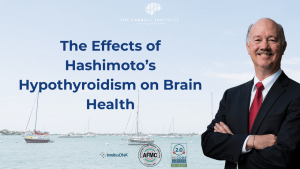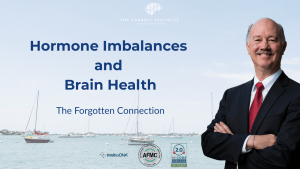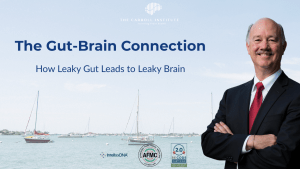Are Alzheimer’s Disease and Dementia the Same Thing?
Key Points
- Dementia describes a group of symptoms, not a single disease.
- Alzheimer’s is one form of dementia, usually with gradual memory loss and confusion.
- Other dementias can arise from strokes, Parkinson’s-related changes, or abnormal proteins.
- Brain imaging and lab tests help determine the cause.
- Early evaluation can reveal reversible contributors (e.g., thyroid imbalance, medication effects).
- Functional medicine and neuroplasticity support may improve clarity and slow decline.
- Knowing the difference helps families plan individualized care.
Understanding the differences between Alzheimer’s and other dementias is key when considering approaches like the ReCODE Protocol for cognitive decline.
What This Means in Plain English
People often use “Alzheimer’s” and “dementia” interchangeably, but they aren’t identical. Dementia is a set of symptoms that affect memory, language, reasoning, and behavior due to brain cell damage and disrupted communication between regions.
Alzheimer’s disease is the most common cause of dementia. It features abnormal protein changes—amyloid plaques and tau tangles—that impair signaling and lead to brain cell loss. Over time, this causes noticeable memory problems, behavior changes, and challenges with daily tasks.
Other dementias have distinct mechanisms. For example, vascular dementia follows reduced blood flow to the brain; Lewy body dementia involves abnormal protein deposits and can include movement and sleep issues; frontotemporal dementia often affects personality, behavior, or language earlier in life.
Types of Dementia
- Alzheimer’s Disease: Gradual onset and steady progression; hallmark memory loss and confusion.
- Vascular Dementia: Results from strokes or reduced blood flow; symptoms may start suddenly or stepwise.
- Lewy Body Dementia: Can involve vivid dreams, sleep changes, visual hallucinations, and movement issues.
- Frontotemporal Dementia: Often younger onset; personality, behavior, or language changes predominate.
- Mixed Dementia: Combination of Alzheimer’s and vascular changes; common in older adults.
How We Approach This at The Carroll Institute
At The Carroll Institute in Sarasota, FL, we help patients and caregivers identify the specific type of dementia and address contributing factors to support brain health.
- Comprehensive evaluation: Medical history, nutritional review, and cognitive testing.
- Root-cause analysis: Inflammation, toxins, nutrient deficiencies, sleep, and vascular health.
- ReCODE protocol: Personalized plans for Alzheimer’s and related cognitive decline.
- Functional neurology & neuroplasticity: Brain-based exercises that strengthen neural networks.
- Caregiver guidance: Practical supports for daily routines and cognitive engagement.
Even when full reversal isn’t possible, individualized support can help preserve independence, reduce symptoms, and improve quality of life.
For those already noticing early changes, see the five warning signs of Alzheimer’s disease.
When to Seek Care
- Persistent memory loss, confusion, or difficulty with familiar tasks
- Personality or behavior changes
- Trouble speaking, understanding, or finding words
- Repeated falls, poor balance, or disorientation in familiar places
Early evaluation offers more options for prevention, stabilization, and support.
Related Reading
- Can Alzheimer’s Disease Be Reversed?
- 5 Warning Signs of Alzheimer’s
- Can Alzheimer’s Disease Be Prevented?
Book a Discovery Call to discuss cognitive screening and prevention options.
Sources
- Reversal of Cognitive Decline: A Novel Therapeutic Program
- Reversal of Cognitive Decline (100 Patients)
- Precision Medicine Approach to Alzheimer’s Disease
- Rationale for a Multi-Factorial Approach for the Reversal of Cognitive Decline
- Sustained Cognitive Improvement Following a Precision Medicine Protocol
Medically reviewed by Dr. Garland Glenn, DC, PhD, IFM, AFMC
Last Updated: October 2025
The Carroll Institute — serving patients in Sarasota, FL
Learn about our ReCODE Program | About Dr. Glenn | About Alzheimer’s & Cognitive Decline | Book a Discovery Call
This content is for educational purposes only and does not substitute for personalized medical advice.

Dr. Garland Glenn, DC, PhD, IFM, AFMC
Founder & Clinical Director, The Carroll Institute — Sarasota, FL
Dr. Garland Glenn is a board-certified chiropractic physician and functional medicine practitioner specializing in cognitive health, neurodegeneration, and root-cause medicine. Certified as an AFMC (Advanced Functional Medicine Clinician) and Institute for Functional Medicine (IFM) trained, he has also completed over 500 hours of advanced training in Functional Neurology under Dr. Ted Carrick, founder of the Carrick Institute.
At The Carroll Institute, Dr. Glenn leads Sarasota’s only ReCODE-certified Functional Neurology program, helping patients reverse or prevent cognitive decline through the Bredesen ReCODE Protocol, neuroplasticity exercises, and personalized functional medicine care.
Learn more about his background and approach at About Dr. Garland Glenn.
– schedule now –
free discovery call
To help you get started, we offer a free 20-minute Discovery Phone Consultation. During this call, you will be able to talk with one of our Certified Brain Health Coaches about what going on with you or your loved one and find out if we can help. Please review our FAQs prior to scheduling your free call. We look forward to talking with you soon and helping you Save Your Brain.
(yes, it’s totally free!)
ReCODE® is a registered program developed by Dr. Dale Bredesen and licensed through Apollo Health. Dr. Garland Glenn is a certified ReCODE practitioner.



